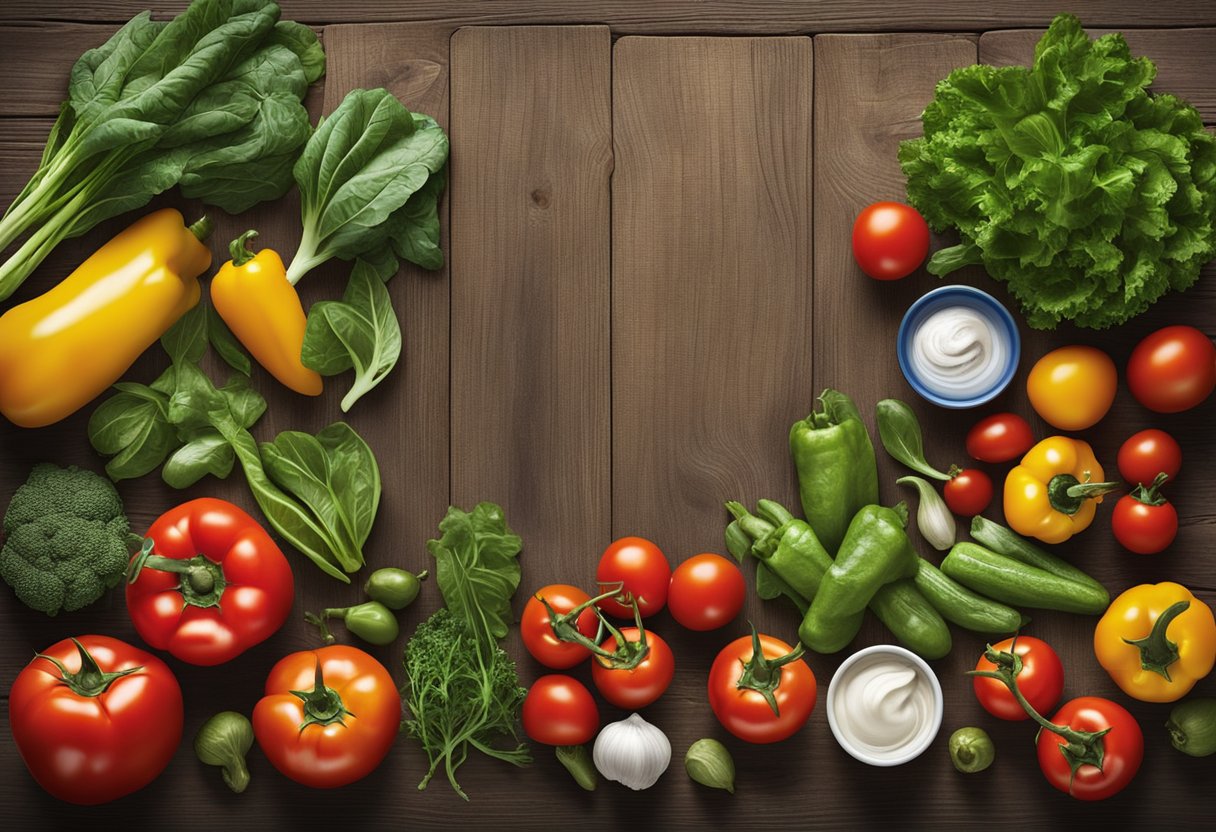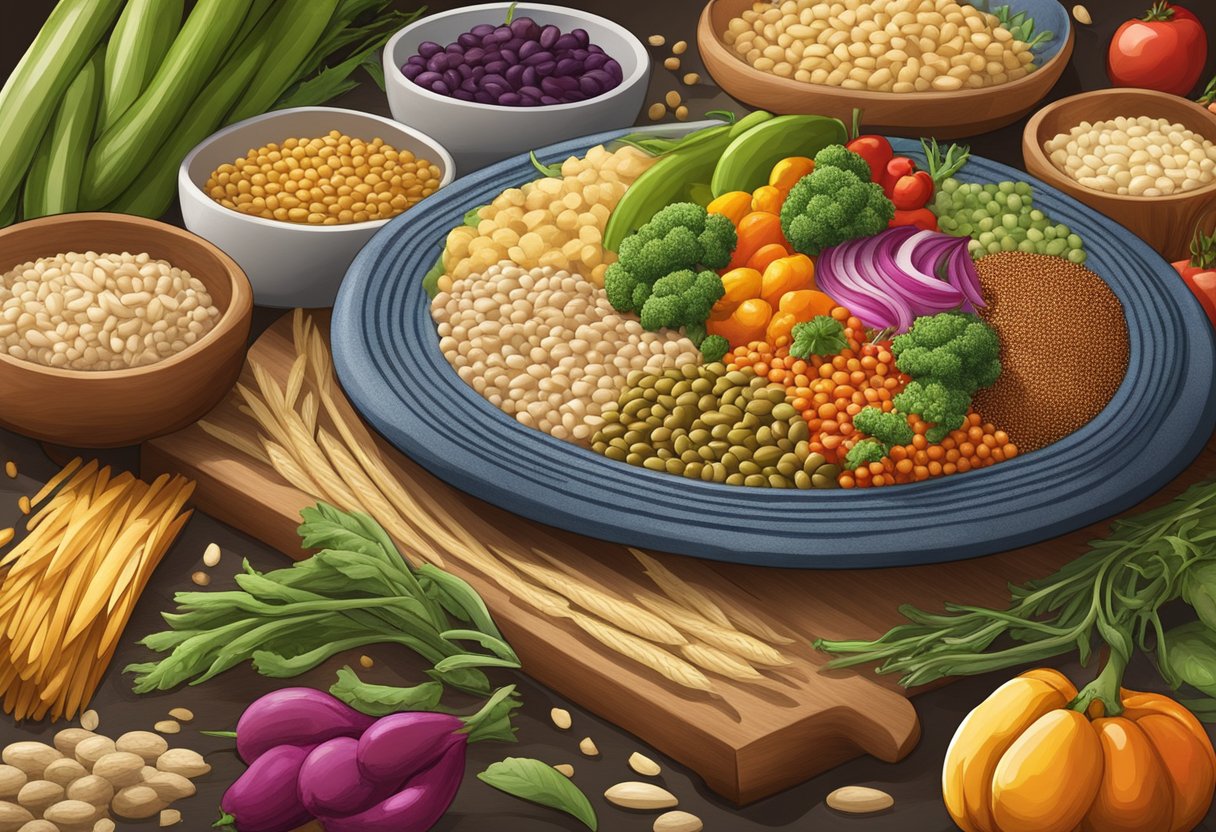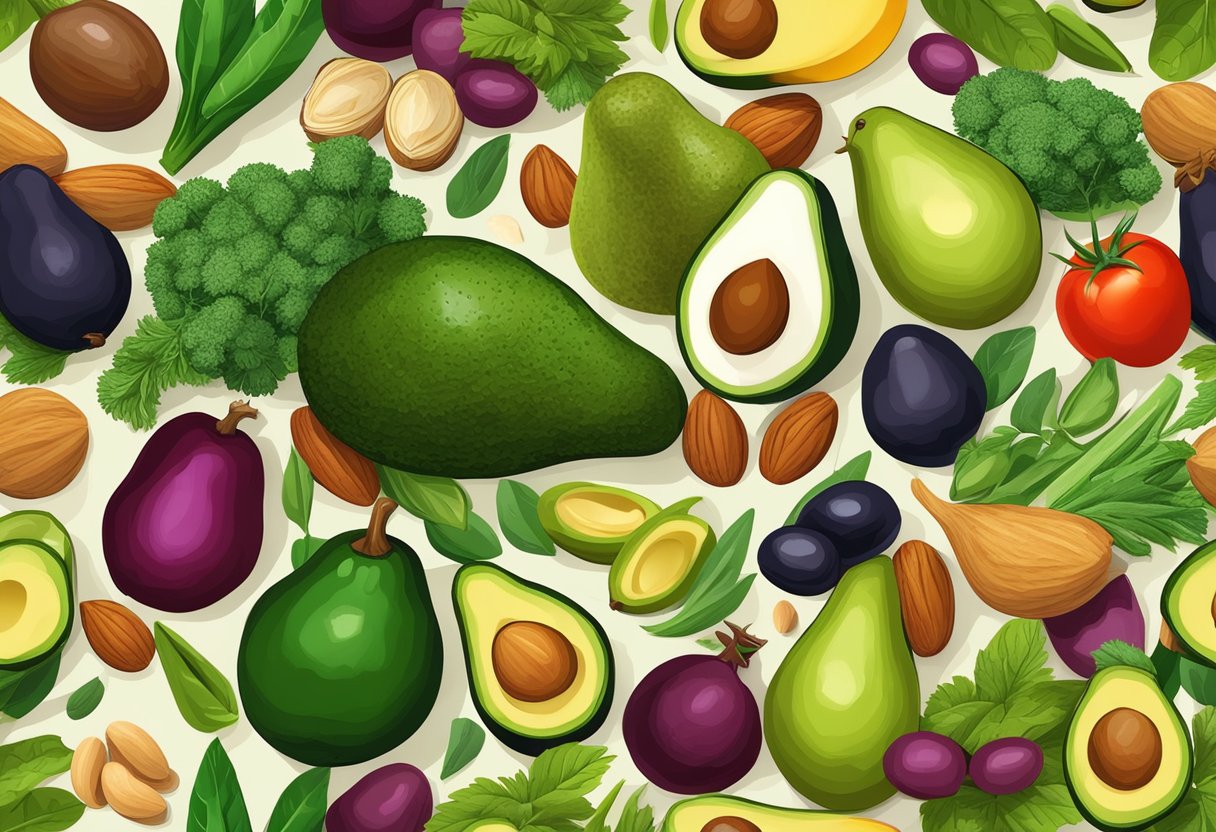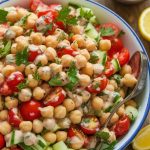Adopting a gluten-free Mediterranean diet fuses the health benefits of the traditional Mediterranean lifestyle with the necessary dietary adjustments for those with gluten sensitivities or celiac disease. At the heart of this diet are vegetables, which play a significant role due to their versatility, nutrient density, and fibrous content. Consuming a variety of vegetables ensures that individuals following a gluten-free Mediterranean diet get a wide range of vitamins, minerals, and antioxidants, which are essential for overall health.

The emphasis on vegetables within this diet goes beyond merely replacing gluten-containing foods. It also involves rethinking the approach to meal planning and snacking. This dietary pattern encourages the high consumption of leafy greens, cruciferous vegetables, and other colorful produce, which can support digestive health and may help in managing weight. Coupled with gluten-free grains, lean proteins, and healthy fats, vegetables act as a cornerstone, contributing to the diet’s reported benefits in reducing the risk of chronic diseases and promoting longevity.
Key Takeaways
- Vegetables are central to the gluten-free Mediterranean diet, providing essential nutrients and health benefits.
- A gluten-free Mediterranean diet involves careful meal planning to ensure dietary needs are met.
- Integrating vegetables with gluten-free grains, proteins, and healthy fats can promote overall well-being.
Table of Contents
Understanding the Mediterranean Diet
The Mediterranean Diet emphasizes a diverse intake of nutrient-rich foods primarily found around the Mediterranean Sea, focusing on plant-based eating, quality fats like olive oil, and an active lifestyle.
Core Components
- Whole foods: The diet is rich in vegetables, fruits, whole grains, and legumes; with an emphasis on foods to be eaten every day such as whole grains, fruits, vegetables, seeds, and nuts.
- Healthy fats: Olive oil is a staple, used as the principal source of fat, alongside avocado and seeds.
- Protein sources: Moderate amounts of fish, seafood, poultry, and dairy are recommended.
- Herbs and spices: These are used for flavor instead of salt.
- Physical activity and social interaction: Incorporated as the base of the lifestyle, signifying their importance to overall well-being.
| Food Group | Examples | Frequency |
|---|---|---|
| Vegetables | Leafy greens, tomatoes | Daily |
| Fruits | Citrus fruits, berries | Daily |
| Whole Grains | Gluten-free oats, brown rice | Daily |
| Legumes | Lentils, chickpeas | Regularly |
| Healthy Fats | Olive oil, nuts, avocado | In all meals |
| Proteins | Seafood, poultry | Weekly |
| Herbs & Spices | Basil, oregano | Liberally |
Health Benefits
- Cardiovascular health: Studies suggest that the diet can improve heart health by reducing risk factors for cardiovascular disease.
- Weight management and diabetes: There’s evidence that the Mediterranean Diet assists in maintaining a healthy weight and may be beneficial for blood sugar control, reducing the risk of type 2 diabetes.
- Anti-inflammatory effects: The high intake of antioxidants from the diet’s plant-based foods can reduce inflammation, a contributor to various chronic diseases.
- Longevity and wellbeing: Following this diet may contribute to longevity and a reduced risk of various lifestyle-related diseases.
Gluten-Free Living
Adopting a gluten-free lifestyle is essential for individuals managing celiac disease or gluten sensitivity. It involves careful consideration of food choices to ensure that gluten-containing grains are strictly avoided while still maintaining balanced nutrition.
Basics of a Gluten-Free Diet
A gluten-free diet requires the exclusion of all foods that contain gluten—a protein found in wheat, barley, and rye. This includes a wide range of commonly consumed items such as bread, pasta, and many processed foods. Instead, individuals focus on gluten-free whole grains like quinoa, rice, and millet. When adhering to a gluten-free Mediterranean diet, one emphasizes:
- Whole, unprocessed vegetables
- Legumes
- Nuts and seeds
- Fruits
- Healthy fats such as olive oil
- Lean proteins, including fish and poultry
Selecting naturally gluten-free foods that are staples in the Mediterranean diet is key to combining both dietary needs effectively.
Impact on Celiac Disease and Gluten Sensitivity
For those diagnosed with celiac disease, consuming gluten, even in small amounts, triggers an immune response that damages the small intestine lining. This can lead to malabsorption of nutrients and various health issues. Similarly, individuals with gluten sensitivity may experience symptoms like bloating, gas, and abdominal pain when ingesting gluten.
Implementing a gluten-free Mediterranean diet not only helps in managing symptoms but can also provide numerous health benefits associated with a traditional Mediterranean diet, such as improved heart health and reduced inflammation. Embracing a variety of nutrient-dense, gluten-free foods within this diet pattern is crucial for maintaining overall well-being while living with these conditions.
Nutritional Considerations

When adapting a Mediterranean diet to gluten-free needs, one must carefully consider the nutritional balance of macronutrients like proteins, carbohydrates, and fats, along with the critical role micronutrients such as vitamins and minerals play in overall health.
Macronutrients in Focus
Proteins: They are essential for maintaining muscle mass and overall health. On a gluten-free Mediterranean diet, sources of protein include seafood, poultry, and legumes. These foods provide the body with necessary amino acids without the gluten found in many traditional protein sources.
Carbohydrates: Carbohydrates should come from naturally gluten-free whole grains like quinoa and rice, along with fruits and vegetables. These foods are rich in fiber, which aids in digestion and helps maintain steady blood sugar levels.
Fats: Healthy fats are a cornerstone of the Mediterranean diet. Incorporating sources of monounsaturated fats like olive oil and avocados supports heart health. The diet also includes omega-3 fatty acids found in fish, which contribute to cardiovascular and cognitive function.
Importance of Micronutrients
Vitamins: A diverse intake of fruits and vegetables ensures an adequate supply of vitamins. Leafy greens, for example, are high in vitamin K and iron, which are necessary for blood health and preventing anemia.
Minerals: The gluten-free Mediterranean diet includes nuts and seeds, which are not only good sources of protein and healthy fats but also rich in minerals like magnesium and zinc that support immune function and bone health.
Balancing the Meal Plan
A balanced meal plan on a gluten-free Mediterranean diet includes a variety of foods to meet nutritional needs. Meals typically consist of:
- A high intake of vegetables, fruits, and gluten-free whole grains.
- Moderate amounts of protein from seafood and poultry.
- Healthy fats from sources like nuts and olive oil.
- Minimal amounts of processed foods and sweets.
By focusing on these food groups, individuals can create a nutrient-dense, gluten-free Mediterranean meal plan that supports overall well-being.
Role of Vegetables
In the context of a gluten-free Mediterranean diet, vegetables are pivotal not only for their versatility but also for the essential nutrients they provide.
Variety and Selection
Choosing a diverse array of vegetables ensures a broad intake of vitamins, minerals, and antioxidants, which are crucial for maintaining health on a gluten-free diet. Vegetables such as leafy greens, bell peppers, and cruciferous options like broccoli and cauliflower are staples in this diet. They offer vital nutrients like vitamin C, potassium, and dietary fiber, which play a role in overall health and can help manage the autoimmune responses associated with celiac disease.
Vegetables in Gluten-Free Cooking
In gluten-free cooking, vegetables are not just side dishes but can form the foundation of many recipes. From gluten-free pizza crusts made of cauliflower to spiralized zucchini noodles, vegetables can be transformed to accommodate dietary needs while adding nutritional value. These methods not only incorporate the necessary vegetable intake but also enhance the flavor and texture of gluten-free meals, making them satisfying and balanced.
Incorporating Gluten-Free Grains

When adapting the Mediterranean diet to be gluten-free, selecting and preparing suitable grains is crucial. They not only provide essential nutrients but also add variety and fullness to meals.
Choosing the Right Grains
For those adhering to a gluten-free Mediterranean diet, it’s imperative to choose grains that are safe and nutritious. Oats are a versatile option, but ensure they are labeled gluten-free to avoid cross-contamination. Rice, both brown and white, is a staple that can be enjoying without concern for gluten. Buckwheat, despite its name, is not related to wheat and is gluten-free, offering a robust flavor. Quinoa, an ancient pseudo-cereal, is also gluten-free and rich in protein and fiber. Here’s a list of gluten-free grains suited for this diet:
- Gluten-free oats
- Brown rice
- White rice
- Buckwheat
- Quinoa
Preparing Gluten-Free Whole Grains
Preparation of gluten-free whole grains requires attention to avoid contamination. Start by rinsing grains like quinoa to remove their natural coating, which can impart a bitter taste. For fluffy quinoa, use a ratio of two parts water to one part quinoa and simmer for about 15 minutes until the water is absorbed. Cook rice by absorption or pilaf methods to maintain its texture. Buckwheat can be toasted lightly before cooking to enhance its nutty flavor. Oats can be prepared as oatmeal or used in gluten-free baking recipes. Stick to the following cooking ratios for best results:
| Grain | Water Ratio | Cooking Time |
|---|---|---|
| Quinoa | 2:1 | 15 mins |
| White Rice | 2:1 | 18-20 mins |
| Brown Rice | 2.5:1 | 45 mins |
| Buckwheat | 2:1 | 15-30 mins |
| Oats | 2:1 | 10 mins |
Using these gluten-free grains provides texture and an array of nutrients without compromising the integrity of a gluten-free Mediterranean diet.
Proteins in the Gluten-Free Mediterranean Diet

In a gluten-free Mediterranean diet, proteins are derived from both animal and plant sources, ensuring a balanced intake that supports health without relying on gluten-containing grains.
Animal-Based Proteins
On the gluten-free Mediterranean diet, animal-based proteins primarily include fish, poultry, and occasionally other meats. This diet recommends a moderate consumption of seafood and poultry, which can be rich in essential omega-3 fatty acids and lean protein. For example, a serving of salmon twice a week fulfills the need for fatty acids and quality protein.
- Fish: Eaten at least twice a week.
- Poultry: Considered a healthier alternative to red meats.
- Meat: Red meats are consumed less frequently due to higher saturated fat content.
Plant-Based Proteins
Individuals following this diet have a variety of plant-based proteins to choose from, such as legumes, beans, and seeds. Legumes like lentils and chickpeas are staples, providing both protein and fiber. Beans, including kidney beans and black beans, serve as another fundamental protein source. They offer the benefit of being naturally gluten-free, making them a safe and nutritious choice for those with celiac disease or gluten intolerance.
- Legumes: Lentils, chickpeas, and peas.
- Beans: Kidney beans, black beans, and other varieties.
Healthy Fats and Oils

Incorporating healthy fats and oils is crucial for a balanced gluten-free Mediterranean diet, especially focusing on sources like olive oil, nuts, and seeds.
Choosing Healthy Fats
Healthy fats are a cornerstone of the Mediterranean diet, and selecting the right types is important for those on a gluten-free regimen. Nuts and seeds are excellent sources of these beneficial fats and are naturally gluten-free. Almonds, walnuts, and chia seeds, for instance, provide both nutrition and texture to various dishes. Including a variety of these in the diet can contribute to overall health and complement other gluten-free ingredients.
Oils in Gluten-Free Cooking
Olive oil, particularly extra virgin olive oil, is a staple in the Mediterranean kitchen and a preferred choice in gluten-free cooking. It enriches flavors and adds depth to a plethora of dishes without the risk of gluten contamination. When utilizing extra virgin olive oil, its use in dressings or as a finish for cooked dishes maximizes the oil’s flavor and nutritional benefits, such as its antioxidant content.
Designing a Meal Plan

Creating a meal plan for a gluten-free Mediterranean diet involves incorporating a variety of nutrient-dense foods that align with both Mediterranean patterns of eating and gluten-free requirements. The emphasis is on plant-based foods, wholesome fats, and gluten-free grains.
Gluten-Free Breakfast Ideas
For breakfast, individuals can enjoy dishes that provide energy and essential nutrients to start the day right, all while adhering to gluten-free constraints. Here’s a quick list of breakfast options:
- Omelette: Packed with vegetables like spinach, tomatoes, and onions, and using olive oil for preparation.
- Greek Yogurt Parfait: Layered with mixed berries, a drizzle of honey, and gluten-free granola for crunch.
Lunch and Dinner Options
Lunch and dinner on this diet feature a colorful palette of foods rich in antioxidants and fiber. These meals often include:
- Salads: Combining leafy greens, a variety of vegetables, chickpeas for protein, and dressed with a gluten-free vinaigrette.
- Grilled Protein: Fish or chicken, seasoned with herbs, served alongside a quinoa salad with cucumbers, tomatoes, and a lemon-olive oil dressing.
By integrating these food items into a weekly plan, one can enjoy a diverse and flavorful diet that meets nutrition and gluten-free needs.
Managing Health and Wellness

The incorporation of vegetables in a gluten-free Mediterranean diet plays a crucial role in managing health and wellness, particularly in preventing chronic diseases and enhancing aging and cognitive health through a synergy of healthy eating and regular exercise.
Preventing Chronic Diseases
Vegetables are a cornerstone of the gluten-free Mediterranean diet, offering a wealth of nutrients that can help in reducing the risk of chronic conditions such as obesity and type 2 diabetes. They provide essential vitamins, minerals, and fiber, while being low in calories. For instance, a diet rich in leafy greens and other non-starchy vegetables can assist in maintaining a healthy weight and improving blood glucose levels.
- Fiber: Crucial for digestive health and helps regulate blood sugar levels.
- Antioxidants: Protect the body from oxidative stress, potentially reducing disease risk.
A regular exercise regimen complements the diet, further lowering the risk of obesity and type 2 diabetes by improving metabolic health and maintaining a healthy weight.
Role of Diet in Aging and Cognitive Health
Healthy eating patterns, like those found in the gluten-free Mediterranean diet, are also associated with better aging and cognitive health. Vegetables, fruits, healthy fats, and lean proteins provide nutrients that may delay the onset of age-related diseases such as Alzheimer’s disease. The diet’s emphasis on healthy fats, particularly Omega-3 fatty acids from fish, is believed to support brain function.
- Omega-3 Fatty Acids: Important for maintaining brain health and protecting against cognitive decline.
- Antioxidant-rich Foods: May contribute to the prevention of cellular aging.
Regular physical activity coupled with this diet strengthens the body’s systems, potentially aiding in healthier aging and the preservation of cognitive functions.
Frequently Asked Questions
In this section, important considerations for a gluten-free Mediterranean diet are addressed through specific questions related to grain substitutes, vegetable selection, dairy alternatives, shopping lists, breakfast choices, and health benefits.
What substitutes are recommended for traditional gluten-containing grains in a gluten-free Mediterranean diet?
Individuals following a gluten-free Mediterranean diet can use grains such as quinoa, buckwheat, and millet as substitutes for traditional gluten-containing options. The Celiac Disease Foundation highlights these grains for their nutritional values and compatibility with a Mediterranean dietary pattern.
Which vegetables are considered staples in a gluten-free Mediterranean diet meal plan?
Vegetables like leafy greens, tomatoes, cucumbers, bell peppers, and eggplants are staples in a gluten-free Mediterranean diet. They are frequently used due to their high nutrient content and versatility in dishes.
Can a gluten-free Mediterranean diet be balanced without dairy, and what are the alternatives?
Yes, it can be balanced without dairy. Alternatives include plant-based milks, such as almond or coconut milk, and fermented foods like kombucha or plant-based yogurts to provide the necessary probiotics and nutrients.
How can one craft a gluten-free Mediterranean diet shopping list to include all essential nutrients?
A comprehensive shopping list should include fresh vegetables and fruits, gluten-free whole grains, legumes, nuts, seeds, and olive oil. Including various protein sources such as fish and poultry ensures a nutrient-rich gluten-free Mediterranean diet.
What are some gluten-free Mediterranean diet breakfast options that align with traditional Mediterranean eating patterns?
Breakfast options that fit this diet include Greek yogurt with fruit and nuts, shakshuka with gluten-free toast, and omelets filled with vegetables like spinach and tomatoes.
Are there specific health benefits associated with combining a gluten-free lifestyle with the Mediterranean diet?
Combining a gluten-free lifestyle with the Mediterranean diet may lead to improved heart health, digestive health, and blood sugar management. The Beth Israel Deaconess Medical Center reinforces the association of the Mediterranean diet with numerous positive health benefits.



